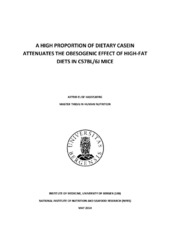| dc.description.abstract | The obesity epidemic is on the rise, and currently represents the largest global health threat. Westernization and advances in food production have led to a contemporary diet comprised of 49 % energy from carbohydrates, 35 % from fats and 16 % from proteins. Former studies have demonstrated the weight-reducing benefits of increasing the amount of dietary protein at the expense of sucrose in high-fat diets, but the impact of specific proteins has not been elucidated. An unpublished study from our group discovered that different protein sources exert dissimilar obesogenic effects in mice when included in a high-protein diet. While proteins from pork promoted obesity development and proteins from cod had an intermediate effect, casein was the only protein to protect against diet-induces obesity. Moreover, the study registered a higher energy intake in the mice fed pork compared to the mice fed cod. We undertook our current study to investigate the obesogenic effect of different proteins and the satiating effect of cod proteins in a high-fat high-protein diet. Additionally, we aimed to expound on the various mechanisms by which different proteins affect obesity development. Thus, obesity-prone C57BL/6J mice were fed high-fat high-protein diets with casein, cod or pork as the protein source, with one pork group being pair fed with the group fed cod. Furthermore, we found it interesting to explore the weight-reducing effects of the same protein sources on diet induced obese mice. Hence, obese C57BL/6J mice were fed low-fat diets with casein, cod or pork as the protein source. In agreement with earlier studies, our results demonstrated that casein was the only protein to attenuate the obesogenic effect of a high-fat diet. On the contrary, mice fed pork gained a significant amount of fat mass and had an impaired glucose tolerance. Furthermore, our results demonstrated that cod-protein had an intermediate effect. In contrast to previous observations, the cod proteins did not promote satiety in a higher degree than proteins from pork. In our second animal experiment, we observed a significantly higher weight loss and an improved glucose tolerance in obese mice fed a low fat diet with casein. Collectively, our results underscore that the dietary protein source is an important factor to abrogate the development of obesity, and implies that it might be beneficial to increase the amount of dietary casein at the expense of pork proteins. | en_US |
